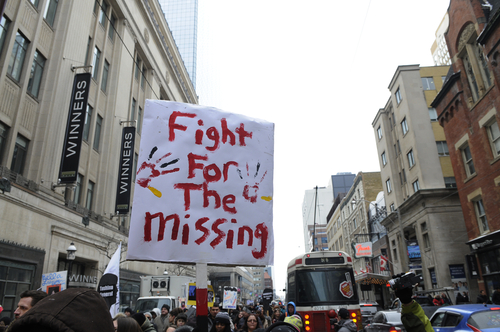
With an underreported wave of missing and murdered indigenous women continuing throughout America, Congress is starting to take notice: last week, Congressional lawmakers introduced the bicameral BADGES for Native Communities Act to acquire more resources for Tribal communities.
“The federal government has for years failed to provide Indian Country the resources needed to ensure public safety and support Tribal law enforcement agencies,” U.S. Rep. Ruben Gallego (D-AZ), one of the bill’s introducers, said. “In the aftermath of the Oklahoma v. Castro-Huerta decision, finding solutions that support Tribal justice systems is more important than ever. That’s why I am proud to lead the BADGES for Native Communities Act to address unmet public safety needs in Indian Country, improve Tribal, federal, and state data sharing and communication in Missing and Murdered Indigenous Persons cases, and improve recruitment and retention of Tribal law enforcement officers to protect tribal communities.”
A 2021 report from the United Nations Permanent Forum on Indigenous Issues recommended the governments of Canada, Mexico, and the United States work together to organize an international expert group to address violence against indigenous women and girls in the region, from trafficking to outright murder. According to the National Institute of Justice, 84 percent of Native women will experience violence in their lifetimes – but, historically, the U.S. government has historically limited tribal jurisdiction, restricting tribal courts’ abilities to criminally prosecute non-Natives who commit crimes on Tribal land.
“Central Washington tribal communities are, unfortunately, at the center of the epidemic of missing and murdered indigenous women, and that is unacceptable,” U.S. Rep. Dan Newhouse (R-WA) said. “The federal government needs to play an important role in helping our tribal communities, and the BADGES for Native Communities Act does just that. It will provide tribes and tribal law enforcement access to federal resources and criminal databases so they can effectively and quickly investigate these tragic cases.”
The BADGES legislation would push progress in some of those areas, seeking to increase recruitment and retention of law enforcement at the Bureau of Indian Affairs (BIA), bolster Tribal law enforcement, increase the effective use of federal missing persons resources, and grant additional resources to states and Tribes themselves to tackle the crisis. It would also offer assistance for tribes to address affiliated cases.
“Inefficient data sharing, poor recruitment and retention of law enforcement officers, and the lack of coordination among Federal, state, Tribal, and local law enforcement agencies remain significant barriers to justice for Native women and children experiencing disproportionate levels of violence,” Lucy Simpson, executive director of the National Indigenous Women’s Resource Center (NIWRC), said. “The Bridging Agency Data Gaps and Ensuring Safety (BADGES) for Native Communities Act will help to address some of these inefficiencies by supporting data systems and law enforcement coordination efforts, as well as empowering Tribes with the resources needed to find our missing relatives and end this crisis of violence.”
The legislation – backed by the National Indigenous Women’s Resource Center, Coalition to Stop Violence Against Native Women, Seattle Indian Health Board, Amnesty International, National Council of Urban Indian Health, and National Congress of American Indians – would also increase Tribal access to the National Missing and Unidentified Persons System, increase outreach and training for Tribes, and require a report on Tribal law enforcement needs overall.
In addition to Gallego and Newhouse, other legislators behind the bill included U.S. Reps. Tom Cole (R-OK) and Sharice Davids (D-KS), as well as U.S. Sen. Catherine Cortez Masto (D-NV).




